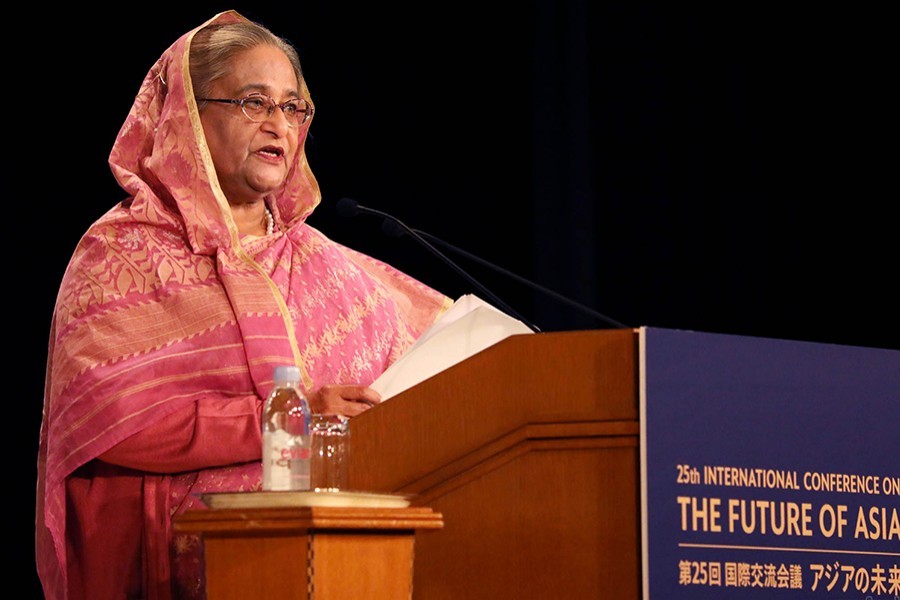The growing protectionist move from many countries may lead to a worldwide trade tension despite Asia being in support of liberalising trade and investment, said Prime Minister Sheikh Hasina.
Hasina shared her thoughts as the keynote speaker in ‘The Future of Asia’ conference at the Imperial Hotel in Tokyo on Thursday.
Despite the positive experience, in recent years a growing trend of trade protectionism is visible as on the other hand, Asia has long been in support of liberalising trade and investment, said Hasina. The protectionist move from many countries may eventually lead to a worldwide trade tension, she said.
“It is a simple economics that tariff rise will cause decline in GDP growth.”
“I expect, this Nikkei Forum will suggest how to strengthen the cooperation of Asian countries and how to deal with protectionism within multilateral trading regime,” the prime minister said.
Today’s world is confronted with challenges and conflicts in many ways, said Sheikh Hasina. “We need to pledge to strengthen the world with greater openness, jointly address global challenges, safeguard fairness and justice and inject new impetus to cooperate using innovative ideas and measures.”
Economies should take innovative practices surpassing alliances. Partnerships need to build on mutual trust and respect, common development and prosperity for a win-win strategy and to the benefit of people; Asian countries need to cooperate with each other in the spirit of openness, inclusiveness, equality, sharing benefits and joint contribution, believes the prime minister. Asia's future will depend on sustainable and balanced development, improving international order and establishing win-win international relations, she said.
“We have to face the development challenges collectively. We may pool together as a group to boost world peace and stability, promote a multi-polar world and protect legitimate rights and interests of developing countries,” Hasina said.
The prime minister shared the economic growth in Bangladesh under her leadership to the forum.
“Bangladesh is recognised as one of the fastest growing economies in the world. We have had a growth rate averaging 6.6 per cent in last one decade, and over 7.0 per cent during the last three years. An 8.13 per cent GDP growth is projected for this year,” she said.
“As Bangladesh is now well set on its growth trajectory, I am confident that the economy will achieve double digit growth soon.”
PWC in a report listed Bangladesh among the top 32 countries which will be the biggest and most powerful economies in 2050, said the prime minister as she highlighted the economic growth.
Rapid expansion of the industrial sector enabled Bangladesh to double annual export earnings to $36.67 billion in just five years, said the prime minister. The McKinsey & Company has dubbed Bangladesh as one of the fastest growing sourcing destinations, emerging manufacturing and distribution hubs, and an expanding consumption economy.
Bangladesh has one of the most liberal foreign investment regimes in South Asia including protection of foreign investment by law, generous tax policy, and concessionary duty on import of machinery, said the prime minister. It also offers hundred per cent foreign equity, unrestricted exit, full repatriation of dividend and capital as it enjoys preferential access to most of the leading world markets, including EU, Canada, and Japan, Hasina said.
“Success of our ready-made garments sector is globally known. We are the second largest readymade garments exporter in the world, after China. Apparel is our number one export product to Japan,” Hasina said.
Bangladesh is now a major global hub for quality medicine exporting medicines to more than 100 countries, including the US, the UK, Australia and Africa, she said.
Ship-building has drawn global attention by producing world-class ocean-going vessels. Bangladeshi companies have supplied passenger and cargo ships to 14 countries in Europe.
“Software is yet another promising industry in Bangladesh. Among 800 Software and IT companies of Bangladesh, over 150 are specialised in serving overseas’ clients. More than 20,000 Bangladeshi IT professionals are working in various reputed IT companies all over the world, including Microsoft, Intel, IBM, Oracle and Cisco,” said Hasina.
She also mentioned agro-based products, jute goods, home appliances, light engineering products, leather products, pharmaceuticals, and electronic gadgets making a mark in the world market.
The prime minister mentioned the prioritising and modernisation of the agriculture sector by her government that resulted in making Bangladesh self-sufficient in food production despite the population growing more than double since Bangladesh’s independence in 1971, bdnews24.com reported.
Hasina also highlighted the development in public health services with more than 18,500 community clinics and Union Health and Family Welfare Centres at rural and community level to provide healthcare services to the grassroots people.
The maternal mortality rate declined to 172 per 100 thousand live births in 2018 from 303 in 2006. Infant mortality rate fell to 24 per 1,000 live births in 2018 from 48 in 2006 while under-5 mortality rate to 31 per 1,000 live births from 62.5 in 2006. Vaccination coverage is now 82.3 per cent and life expectancy is more than 72.8 years, she said.
Bangladesh has always promoted peace and progress that would directly benefit the people, said the prime minister. Increasing close interdependence among economies in Asia and beyond will add further wealth to the economies and societies, she said.


